
Editor’s note: Many thanks to Dr. John at Flopping Aces for bringing this 6-year-old-post back into our “Popular Right Now” column for a few minutes. I hope he’s given himself a good pat on the back for his snarky observation; I hope you’ll read just a bit more than he obviously did…. it’s a short post, and not that hard to understand (especially for someone with his educational background).
Last week I wrote a post about curbside composting programs that some cities have started. One of the benefits of keeping compostable food out of landfills, I wrote, is that it reduces landfill methane – a greenhouse gas that is 72% more powerful than carbon dioxide.
One of the readers, Dean, posed a question in the comments.
Does this actually reduce methane emissions? It seems, based on the lack of detail in the article, that the same amount of methane would be produced whether the organic waste was sitting in a compost pile or a landfill. Why wouldn’t that be true?
This is a good question, and I thought it deserved to be answered in a post instead of just a reply in the comments section.
Landfill methane is a gas that is produced in a landfill because the things in the landfill undergo anaerobic decomposition. Basically, this means that because municipal solid waste that is buried in a landfill does not receive oxygen, it will produce methane.
A compost pile, on the other hand, undergoes aerobic decomposition. Because it is exposed to oxygen, either by turning it or through the use of worms and other living organisms, it produces CO2 (carbon dioxide) instead of methane.
Of course, not all compost piles are treated the same, so some attention needs to be paid to the compost pile to so that it receives the oxygen that it needs. But, if a compost pile is being taken care of properly, it will produce far less methane than a landfill.
This is a very basic answer, but I think it should answer the question as to why food waste is better off in a compost pile than in the local landfill.
Image credit: megansquire via Flickr (Creative Commons)

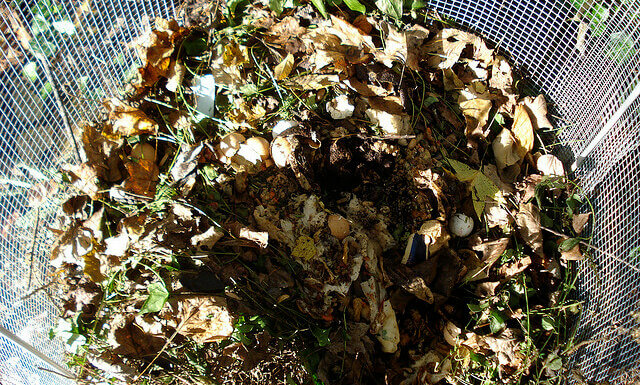

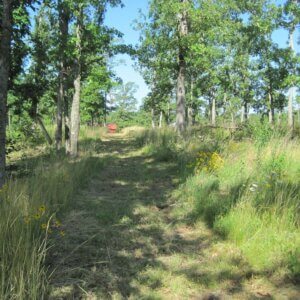






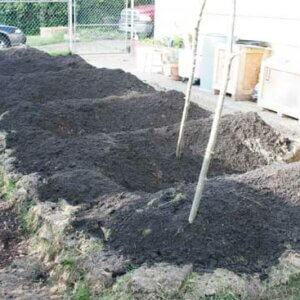














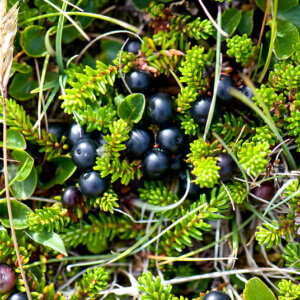

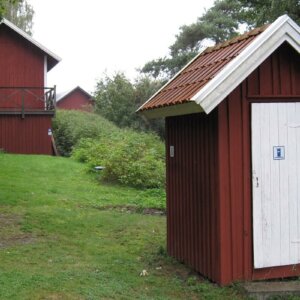
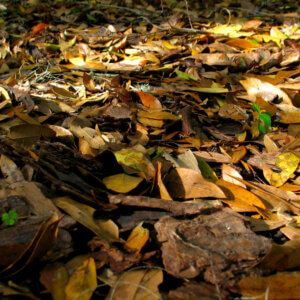
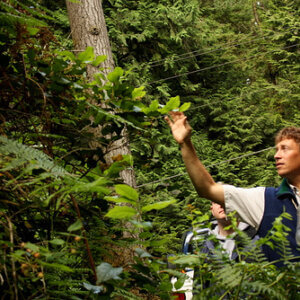






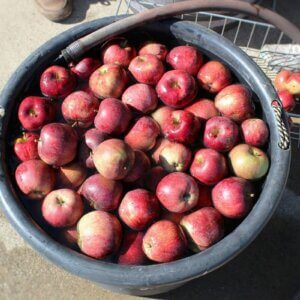

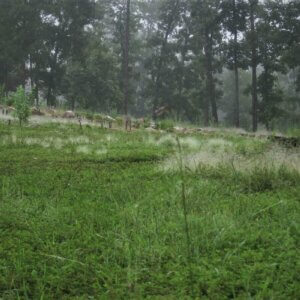



It is a fair question – for my masters thesis I decomposed various organic materials and measured the CO2 released. Generally, wetter composts are more likely to go anaerobic than drier ones. Later I considered this on a bigger scale when I worked on large industrial compost windrows. At this scale it is very difficult not to have some of the compost becoming anaerobic and releasing methane. This is generally linked to the carbon:nitrogen ratio of the constituents of the windrow, and as carbon rich materials are expensive. You get a massive burst of methane released every time you turn the windrow.
The main difference with a landfill is that in a landfill all the organic materials and inorganic materials are mixed in an unholy mess, whereas at least you know what you’ve put into a compost windrow. The chances of weird mixtures of breakdown products are therefore much higher, never mind the imperfect conditions for the organic matter to breakdown leading to extra methane production.
That said, this is bucket science on a grand scale – and compost sites are very common causes of odour complaints, mainly due to poor oxygenation.
I have invented a system to capture and confine natural gas venting from sea-bottom fissures, and melting tundra thermo-karst lakes. It also could be adapted to capture gas from curbside compost piles. Would this improve the argument for their use? Also, I am looking to hire a recent graduate with knowledge in an interest in developing the compost pile collection component. My phone no. is 904.349.5900.
Thanks for that. It is also important to note that compost also can be sold or used in city programs, whereas landfills are covered over and can produce problems if built on. We had an issue of this in Cleveland!
I still don’t think its so cut and dried…
Firstly, curbside composting doubles the carbon footprint for garbage collection. Instead of one giant diesel truck lumbering through your neighborhood every week, you now have two: garbage truck and compost truck.
Secondly, a poorly maintained compost heap could be worse than a well maintained garbage dump. Some well maintained dumps inject oxygenated water into their systems, reduce methane, and speeding up decomposition. Really high-tech dumps can recover the methane, and turn it into fuel.
On average, composting is probably better… but in highly green states on the west coast, odds might be that the dump is greener than centralized composting.
Although, both are less green than home composting.
“On average, composting is probably better… but in highly green states on the west coast, odds might be that the dump is greener than centralized composting.”
This is all contingent on the design of the pickup. I have studied numerous waste systems and management methods and have yet to see a landfill that I and others believe to be a better approach to holistic waste management.
Even if you pick up the compost in a different truck, you have to consider the regular trash trucks could be driving around up to a 1/3 less weight, which translates into lots of diesel savings.(especially in a place like San Fran)
Secondly, it is not necessary to have two trucks. If you had a decentralized composting system it is conceivable that the truck could pick up trash and compost. Also, it does not require a truck. There are communities that are in the process of running a compost pickup on bicycles. Not to say that riding bicycles doesn’t entail carbon release,( calories= food which probably needs carbon in some stage of its lifecycle) but that is the best option.
Then you also have to put into the equation the value of the end product, namely compost.
Hey Robin,
Thanks for clearing things up. Makes perfect sense now. Even if both were comparable, composting provides a resource that garbage trucks take away to remote locations. But, not everyone grows their own food, so not everyone understands the value of so-called “trash”.
Who knows? In the future, we may have deposits placed on all sorts of inedible, organic material, just as some places have them on recyclable materials now. It seems like a no brainer for metropolitan areas that have to transport trash over relatively long distances to an accepting disposal site.
“A compost pile, on the other hand…produces CO2 (carbon dioxide) instead of methane.”
Whoa! Hold on a minute! Do not the greens claim that it is atmospheric CO2 (a by-product whose only origins are the activities of western man) that is the primary cause of global warming? Isn’t opting to manufacture CO2 via composting in lieu of producing CH4 in a landfill simply trading one evil for another?
Methane is a strong greenhouse gas, stronger than carbon dioxide. The difference between methane and carbon dioxide in atmosphere is residence time: Methane remains in atmosphere as methane for about 10 years; carbon dioxide remains in atmosphere for over a thousand years. Worse, though, when methane does break down in atmosphere it becomes in part, …. carbon dioxide. Naturally, if methane is burned, it also is converted in part to carbon dioxide. The win with compost as I understand it is that because it is an aerobic low energy process, much more of the carbon gets sequestered in soil, and ultimately in plant bodies. Unfortunately, to see all this, you really need to look at the chemical reaction rates and such.
The other issue with composting is as with recycling of plastics, metals, paper and so on – even if there are no emissions or energy reductions as a result, we save on physical resources.
Organic material provides fertility to land. If you export that fertility (eg a farmer selling their food) then you must replace it. You can replace it with natural material (compost) or with artificial material (nitrogen fertiliser made from natural gas, etc). This is the reason that farmers would burn the stumps of their crops, put animal manure on the land, and so on.
If we put organic material in landfill, its fertility is lost to us. Mixed in with plastics and metals and so on, the land will be poisonous and you can’t grow food there. But if you compost the stuff you can return it to agricultural land and help you grow food.
“Isn’t opting to manufacture CO2 via composting in lieu of producing CH4 in a landfill simply trading one evil for another?”
Bobby, not exactly. It’s choosing the lesser of two evils.
Organic material with 1 unit of carbon in it will produce either 1 unit of CO2 or 1 unit of CH4. But 1 unit of CH4 has over twenty times the warming effect of 1 unit of CO2.
Whatever you do with organic materials you will get some greenhouse gas emissions. The only question is whether it’s emissions with a relatively strong or relatively weak effect. So we can have something which produces 1 unit of warming, or 20+ units of warming. There is nothing we can choose which is 0, we have to choose between 1 and 20+.
It’s trading a lesser evil for another. Which is not too bad.
Which of course you could have found out in five minutes with google. Alas, denialists are less keen on research and more keen on drive-by comments.
Kiashu – Thanks for resorting to name calling to tag me a “denialist”, although I personally prefer the term “skeptic”. Also, I am well aware of the claim that CH4 = 20X the warming effect of CO2 (nice try at the stupidity angle). However, most in the modern green crowd have chosen to demonize CO2, not CH4. In the purest sense of greenism, isn’t accepting any form of evil wrong?
Bobbie B says: “Do not the greens claim that it is atmospheric CO2 (a by-product whose only origins are the activities of western man) that is the primary cause of global warming? . . . I am well aware of the claim that CH4 = 20X the warming effect of CO2 . . . . However, most in the modern green crowd have chosen to demonize CO2, not CH4. In the purest sense of greenism, isn’t accepting any form of evil wrong?”
(1) “Greens” do not “claim” that atmospheric C02 is the primary cause of global warming: this is a fact affirmed by ~97% of scientists performing active research on the Earth’s climate (as proved by several surveys, e.g. http://green.blogs.nytimes.com/2010/06/22/evidence-for-a-consensus-on-climate-change/ ).
(2) No scientist has ever claimed that atmospheric C02 is “a by-product whose only origins are the activities of western man that is the primary cause of global warming.” Every scientific paper ever published on the subject attributes the majority of the C02 presently in the atmosphere to natural sources. We have merely (merely!) increased the atmospheric C02 concentration by about 36% (and accelerating) since the start of the Industrial Revolution, mostly but not entirely by burning fossil fuels: that fuels are the source of the new C02 is proven by showing that its carbon isotopes match the distinct isotopic fingerprint of fossil carbon (http://www.realclimate.org/index.php/archives/2004/12/how-do-we-know-that-recent-cosub2sub-increases-are-due-to-human-activities-updated/ ). Nature kindly tagged the fuel atoms for us. The fuel is going into the air when we burn it. Not complicated or mysterious or tricky.
(3) Recognizing the state of scientific knowledge on C02 and climate is not “demonizing” C02 but facing physical reality. Nor has any serious commentator or scientist somehow forgotten about methane. If you care to look at the very conservative (because -multi-government-approved) summaries produced by the Intergovernmental Panel on Climate Change, you will find thousands of words devoted to methane and a host of other greenhouse gasses, as well as non-gas factors like changes in albedo (reflectivity), aerosols, and more (http://www.ipcc.ch/publications_and_data/publications_ipcc_fourth_assessment_report_wg1_report_the_physical_science_basis.htm).
(4) If a kilogram of carbon must unavoidably be released to the atmosphere, reducing its greenhouse potential by a factor of ~20 (by releasing it as C02 rather than CH4) is a nontrivial win. Choosing the lesser of two evils is a perfectly reasonable and non-hypocritical course in cases where there is no way out of the choice.
(5) Denialist or skeptic? Well, what evidence do we lack that would convince you that climate change is occurring, hazardous, and human-caused? If you can name specific physical evidence, justify your standard reasonably, and are willing to examine the scientific literature to see whether or not the named evidence has already been produced, you are skeptic, not a denialist. If you cannot be satisfied by any actual evidence, you are a denialist, not a skeptic. Skepticism is the adjustment of the degree of one’s belief to the state of the evidence; mere disbelief is not skepticism. All working, competent scientists are skeptics. In particular, all working climatologists are climate-change skeptics.
Larry
A sceptic questions, and looks in detail at answers given. A denialist simply denies, and continues denying regardless of the answers given.
There is no “purest sense of greenism”. “Green” is like “Labour” or “business” or whatever, it’s simply a statement of what the person thinks is most important in shaping our policies.
It’s impossible for us to have no effect on the world we live in. All we can do is to ensure that if our effect is not positive, it is at least as small negative as possible.
I appreciate that it’s much easier to win arguments when you respond not to what people are saying, but to some other stuff you made up yourself. Don’t be ashamed, that’s an old technique, done as far back as the Socratic Dialogues – where both Socrates’ words and those of his opponents were written by Socrates, unsurprisingly he won all those arguments.
No greenie over the age of 14 has ever said that any CO2 at all is wrong. Many are foggy on the details, but all understand that even just breathing produces CO2. We can’t hope to have zero impact on the environment, only to have a positive impact in some areas to balance out a minimised negative impact elsewhere.
If you contend with what people actually say rather than stuff you made up yourself, your conversations will be much more productive. That is, if you actually want productive conversations where people exchange ideas and learn from one another. Alternately, you may just want to be like Socrates and say, “haha! i r teh winnah!”
Is the best thing to do- put the garbage in a bag and bury it in a landfill? massively reduced emissions
I know, there are probabaly caveats, but this is the whole problem with this conversation. What we need is a serious study with serious numbers. This has a quantifiable answer, but all I here are guesses
Actually, Ben was the one who asked the great question. I just promised to search for the answer. Looks like you beat me to it.
Fortunately, I do have something to add to the discussion. You are absolutely right, the difference is that Carbon Dioxide is better than methene. Not only is methane a serious greenhouse gas, it is highly explosive. THAT is why landfills are now required to take precautions that the methane gas can be caputred (though the methane gas can be used/resold after capture).
Home composting is a great way to go. Municipal composting is great. Let’s face it, people willing to compost at home make up a small minority of folks. This isn’t likely to change any time soon. Commercial composters have a great incentive to get it right — if they don’t and the compost goes anerobic, it reeks (and they risk getting shut down).
Kiashu – Touche! Very well done. However, I have read more than I care to remember about global warming and sincerely believe that a majority of the papers published during the last decade have focused on the warming effects of man-made CO2, not CH4. I will admit that I was being absurd in an effort to illustrate absurdity, and to pull someone into an expanded discussion. I do not claim any sort of victory. However, I do hope that others will learn that the scientific community is not in lock-step agreement on the issue of global warming. I see the greatest danger being the development of an environmental religion in which no one retains the ability (or the right) to think independently and swears an allegiance to some green high priest. After all, the global warming issue has in many arenas become less a scientific endeavor than a two-sided discussion about a belief system.
Two sentences in your last post do intrigue me:
“It’s impossible for us to have no effect on the world we live in.”
“We can’t hope to have zero impact on the environment, only to have a positive impact in some areas to balance out a minimised negative impact elsewhere.”
“The world we live in” continues to espouse the concept that man is a trespasser on earth who is separate from nature, rather than a being who is part of the natural world. Scriptures suggest that man was formed from the very soil of the earth, as opposed to being spoken into existence like the other beasts. Evolution suggests that all life originated from a single pool of ooze that just happened to contain two living cells that could reproduce. Since man has an arguable physical connection to the earth, maybe our purpose is to have a positive effect rather than no effect whatsoever. The problem is an inability to agree upon which of our actions can be deemed positive, negative, or downright damning.
As far as the topic of composting, I see no harm in choosing to compost or to landfill most organic wastes. However, the decision to do either should remain a personal choice.
Dear Joe
Thanks for your fascinating comment. INterested in the bursts of methane released when compost is turned. Am also doing a Masters on this. The IPCC has very little on this.
can I quote you? What’s your surname? Know of any figures or studies?
Some best practice landfill only releases 10% of the methane to the atmosphere. Could bad compost be worse?
Also, Robin, methane is not 72% more potent than CO2, it’s 72 TIMES more potent a greenhouse gas, over 20 years (or 23 times over 100 years because CO2 lasts longer). Thank you for raising this issue, it’s very important.
Joe’s comment was the best researched, but who are you Joe? Can we quote you?
-Barbara from Australia
Several issues here. First this ignores the fact that many landfills siphon their methane for energy and thus turn it into co2+ energy. Second I do not buy the whole C02 greenhouse gas argument. It to me reeks of alchemey. There is no more carbon in the world today than there has ever been, that is a fact of science. The issue is sequestered carbon. Your garbage that is composting was not sequestered. No matter what you do with it in the end it will release co2 be consumed by plants and put back into a carbon compound. We are spinning ourselves around chasing a system that has worked since the beginning of time and now all of the sudden is broke or harmful? As a farmer I know that plants would LOVE a Co2 system that is 3 times richer than what exists now. They would grow faster and produce more food or lumber. The CO2 arguement is false and it is causing us to ignore the true issues facing the environment now. We will waste millions to change something that is not broke and in return ignore real environmental issues that could not be fixed due to lack of funding.
Nope, please don’t quote me. There are lots of large studies on this in reputable scientific journals to use if you are writing a thesis which show what I am explaining. Please use your library and find them.
I completed my studies more than 10 years ago and spent some time working as a composting consultant, measuring and trying to understand various aspects of the industrial composting process.
Given this is a very small field, before long I had to find alternative employment. But as I said, if you are completing higher education, don’t take the word of someone online, check out proper peer reviewed papers.
Thanks for this post, I was listening to David Sizuki on the radio talk about how we should all compost to reduce methane gas and this was the first question that popped into my head.
This has inspired me to talk to the building management about a compost setup for our building. We have a few gardens on the property and there is a really nice community garden directly across the street. I’m sure they’d take our heaps of rotten goodness 🙂
Cheers
With methane at 0.00017% of the atmosphere and CO2 at 0.038%, the whole thing is academic in comparison to water vapour which really is the main greenhouse gas and which cannot be modelled accurately. Because this major input cannot be properly accounted for, all models produce invalid conclusions.
This article is spot-on! I work in this area and think this is a good simple explanation of why composting is so much better than landfilling.
Even landfills that have gas capture systems still have very high fugitive emissions (as much as 80% of the gas generated, according to the International Panel on Climate Change). Significant methane releases are far worse than the release of short-term CO2 in aerobic composting (i.e. grass grown on your lawn sequesters carbon as it grows and releases it as it decomposes in a compost pile, but in a landfill it breaks down anaerobically and forms methane which is 25x worse from a climate perspective). On top of all that, if you use the compost on a farm it reduces how much you need to irrigate the crop and how many fertilizers/pesticides you need. Check out this Lifecycle Assessment to see all the benefits: http://www.recycledorganics.com/publications/reports/lca/lca.htm.
Holy Shiite! What a chance for the bio-digester! Traps the Methane in compressible bottle-able form! Yields top soil building fertilizer sludge, liquid fertilizers transformed to ‘safe for re-use’ form! Takes humanure, offal, too! What resource flow waste! San Antonio Texas does this! Enlightened! They follow the Swedes in this technology! Swedes run buses on the methane ! Oslo, Capital city of Norway runs city buses on this gas too! Fertilize burned out fields with the sludge! No need for oil based fertilizers! Americans have been lied to long enough! Time to examine closely the oil baron financed corporatist propaganda machine! For more truth on this issue Google, torrent, “Who Killed The Electric Car” and study this movie well, weep for America then retaliate with vigor against these crooks! America must change, they are being forced by a weakened dollar and a stronger Yuan to share world’s finite resources with Asians! Especially Oil! More has not been found! Asia begins to buy it in great quantity! With stronger Yuan! from America’s share! We are in a bad bind! In a decade oil will price itself out of our reach and we depend on it to sustain our Status Quo maintenance! The writing is on the wall! Compost is Gold! Humanure from well fed Americans richer than Asian pig-shit for bio-gassing! Bottled “Consumer Gas” from the bio-gas works will soon rival propane, L.P. gas as a cheaper more bountiful fuel! Even Factory Farms will be forced to clean up their acts and produce bio-gas as “Consumer Gas” as the oil is all bought up by a very strong Yuan for Asian cars! GM(China) turned 30% ROI last year! Producing gasoline burning cars! Asians buy them, run them at premium prices higher than state-side! 1.6 Billion Chinamen alone trying to run cars, India even larger! The Asian hordes are upon us! We actually import food from them just to survive! WTF??? All true all this decade! What does the next decade bring? What are the chances for American “Status Quo” to survive? Slim to none! Expect convulsions of paradigm shifts all over America, starting now! Worse when the dollar crashes, hyper-inflation sets in! Saving Shiite in a bag for the Gas-works won’t seem so crazy when the price of gasoline is in the $15.00 / gallon range and rising! Hang on! Its a heck of a ride to the bottom! Gold at $1200.00 / oz. a harbinger of a market failure in the works! Bonds all junk now, not trusted, dollar bills soon worth nore than the firewood they buy in heat, and all around polluted America no place for survival for man or beast! What have we done to God’s garden, America, in two hundred short and glorious years? our forefathers roll in their pollution soaked graves! Shame and a great comeuppance upon you American! Scourge of the good earth, foul animal on God’s good soil! Sick, sick, sorry assed, unsustainable animal! Your rapid demise written on the wlls of time in greed, sloth, pride and lust, Gluttony and Envy – your wrath will bring Nuclear Armageddon on the Middle East – an innocent people, for gasoline to fuel your pleasures and God will pause, and with Mother Nature eradicate you from the face of the Earth in climate change you brought upon yourselves! Now, go your greedy way, and fulfill Histories’ pages with your follies, Great fattened assholes! Composting, and humanure processing one change you ignored on your trip to the bottom!
Methane is 21 times more potent as a greenhouse gas than carbon dioxide. It’s on the EPA website. Plus, I did a master’s thesis on the biofiltration of methane from landfills…I’m pretty sure. 🙂
This document may be useful, regarding composting how to do it to minimize methane production.
I cannot vouch for its contents, but I found it and it seems germane to the blog entries above:
http://www.climateactionreserve.org/wp-content/uploads/2009/11/Reserve_Composting_Issue_Paper_Final.pdf
I can’t say that I read every word of this argument, but one thing appears to me to be missing. There is nothing wrong with recycling carbon as CO2. This does not increase the atmospheric CO2. It merely recycles it through plants and then through decomposition or eating and breathing back to CO2. We would be in a bad way without the carbon cycle. The problem with CO2 is that of releasing fossil carbon that has bee sequestered for hundreds of millions of years, and thus increasing atmospheric CO2 now, when we have a climatic pattern that was established and maintained by a lower level of CO2. Recycling our carbon through methane instead of through CO2 increases the greenhouse effect and thus contributes to global warming more than CO2. Therefore, we want to recycle our carbon through CO2 instead of through CH4 whenever possible.
Would someone please tell me whether sewage processing generates more methane than home composting of municipal composting. Does the sewage works oxygenate the sludge to the point where most of the gaseous carbon comes off as CO2?
Can someone tell me how much methane is reduced as a result of keeping food waste out of the landfill. My company partners with the landfill in Monterey, CA to develop a food waste collection program for the city. The food waste is turned into compost and sold back to the ag community as compost. It would be great to quantify what we are doing. If we want people to be on board and collect their own food waste as part of a residential program, we need to tell them exactly what impact they are making.
Methane gas is a form of energy. If the landfill produces methane, why can we not capture this as a usable form of energy?
Ron, it can be, and is done on some landfills. Search this page for the word “capture,” or search the web.
Bobby b , composting produces ( biogenic emissions in the form of co2 (piles that are not properly aerated can also turn anaerobic and produce ch4). the co2 comes from organic waste that once sequestered co2 in the form of plants/crops. Biogenic emissions are distinct from anthropogenic emission and that they part of a biological process.
actually i would say that both landfill and compost pit have their positive sides.Landfill releases methane which is considered very harmful .But if it is used in some or the other way then it might be proved very useful.One of the ways can be that using methane as a fuel .
So, what about all those anaerobic composters? Like the bokashi ones and all the other similar non-oxygenated ones? I have a very small apartment with no yard so I have a bokashi composter that fits under the sink. If it’s bad for the environment and producing methane, should I toss it? Is a landfill better? Or put food scraps in the sink disposal?
Alex– I’m seeing lots of claims that bokashi produces no methane, but they’re generally not from scientific sources… but, truthfully, even if it did, the amount you’d be producing as an individual would be pretty minimal. The problem, as I understand it, tends to come from large-scale composting facilities.
Thanks Jeff! I’m looking into it and you’re right — there are a few articles I’ve found so far that say that bokashi composting, though anaerobic, doesn’t create CO2 or methane because it’s a fermentation process. Hopefully that’s true! Because even if I am just 1 individual, I still want to be helping the problem, even if only a little bit 🙂
Watch a quick video that explains the science of how a landfill works and why turning food and yard waste into nutrient-rich compost for gardens, parks and farms is a better solution than burying it in a landfill.
http://www.youtube.com/watch?v=mQCz3Ygs568
can you point to a peer reviewed study with data to back up your assertations?
No, because he’s wrong !
Sooo…after being told for the last decade that CO2 is the ultimate death gas for the planet, the Greenies are now insisting that we make MORE of it by composting??
Yep, you got us, AC… because that stuff wouldn’t have turned into CO2 otherwise, would it…?
methane gas is more problematic than carbon dioxide as a greenhouse gas, methane captures a lot more heat than carbon dioxide in the atmospthere
I wasn’t addressing the theoretical science. I was commenting on the incredible irony.
CO2 is turned into O2 by trees and plants. In a nutshell, stop cutting trees, and CO2 won’t be that big a problem. But I suppose this would be too much for a brownie, who needs parking space for their car, and infinite Roundup-drenched Monsanto corn fields to make high fructose corn syrup for their daily diet.
Love it
CO2 helps protect us from the Sun’s radiation too.
Same can be said about the landfill, attention needs to be paid to manage the landfill to best practice and extract as much methane gas as possible to flare or use to produce electricity.
There are examples of poorly managed landfills and compost practices. Both have pros and cons.
I would be interested in references too, this has always confused me. It makes sense intuitively knowing as much as I do about different composting types, but evidence is better than intuition!
Regarding AC’s point, I think s/he has missed the point – according to the article home composting *doesn’t* produce methane, degrading in a landfill (which is not what most people mean when referring to composting) does. Methane is has a greater contribution towards climate change than CO2. So home composting is preferable to degrading in landfill (per the article).
Methane is .00017% of the earth’s atmosphere. CO2 is not pollution, methane is nothing but CO2 and water.
Great article.Thanks for sharing views.
What is the effect of removing organic material from the landfill in regards to the decomposition of the remaining inorganic materials? Seems logical to assume if you reached the goal of zero organic material in the landfill we would be left with more of a junkyard that will take eons to decompose without the organic material used as kindling. The landfill where I live captures and burns the methane gas. So…. I can’t help think that this involves more wishful thinking than actual science. I keep looking for the science. Where is it?
The man requests science. Someone go get science to the man.
http://whatcom.wsu.edu/ag/compost/fundamentals/biology_aerobic.htm
http://whatcom.wsu.edu/ag/compost/fundamentals/biology_anaerobic.htm
I do keep looking for science too myself. And I searched in your reply for the science behind how would a plastic coca cola bottle degrade faster if it is coupled with a banana peel. But I did not find the science with the exception of the word “eons” which is a scientific word, perhaps I haven’t searched hard enough. So can you please point me towards that science? I love science.
Check out Cornell university’s website and look up composting. Then look up what happens to methane in the atmosphere.
What happens to methane in the atmosphere has absolutely nothing to do with the difference in off gassing between organic material laying in a pile at your house that you poke now and then, and a pile of organic material that someone pokes with a tractor now and then.
The guy asked for SCIENCE, not opinion. Everything on this planet stays on this planet, what natural processes that occur is relevant ! Ever heard of a SINK.
A rotten apple is still a rotten apple the amounts of gas has nothing to do with where it rots.